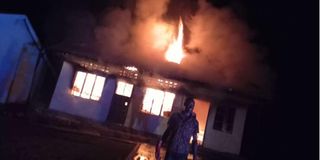School fires: Play your part

What you need to know:
- Investigation findings by the National Building Review Board (NBRB), a body mandated to ensure safety of the built environment, have revealed that our practices are contributing to the scale and severity of the consequences of these fires.
Section 18 subsection 1 of the Traffic and Road Safety Act, 1998 which was amended in May 2020 requires all drivers to be in possession of a copy of the registration book in respect of the motor vehicle, trailer, or engineering plant.
This amendment together with many other attempts including but not limited to; the installation of traffic cameras on major highways and towns/cities, roadblocks and checkpoints, and the most recent/current effort to install digital license plates for all motor vehicles are efforts by the government to mainly curb the everyday increasing crime rate in Uganda.
Fire outbreaks in schools have happened and continue to happen; no school is safe from this problem, more so schools with boarding facilities. Investigation findings by the National Building Review Board (NBRB), a body mandated to ensure safety of the built environment, have revealed that our practices are contributing to the scale and severity of the consequences of these fires. For instance, many dormitories are built alternative exits for emergency evacuation purposes, and yet we have the school administrations blocking off these exits with beds so that they can accommodate more learners; an act that is greatly compromising safety.
The learners hung their mosquito nets on wooden trusses, providing a quick route for a fire. To make matters worse, some hung their clothes on the electrical cabling risking electrocution and short circuiting.
In April 2008, the country woke to a fire at Buddo Junior School that resulted in the death of many children. The wave of horror travelled across the country. Accordingly, government, through a coordinated effort involving several ministries, agencies and Uganda police, came up with and disseminated guidelines for schools that same year, to address the gaps. Sadly, schools looked at these guidelines as just a box to check; the administration locks away the extinguishers in the stores, the majority have equipment that is not functional (not serviced). Henceforth, the situation has not improved.
In 2022 the police department of Fire Protection and Rescue Services recorded 61 fire outbreaks with 18 lives lost. Among these are the 11 pupils of Salama School of the Blind who perished a fire that gutted their dormitory in October.
The children implore us to play our part; The school administration – legislation and guidelines have been issued for implementation, make fire safety part of your routine; seek guidance on aspects that are not clear; talk to the learners about the fire equipment in order to obtain buy-in so they don’t vandalise the equipment; caretakers should not be allowed to cook from the dormitories or even near the dormitories, learners should not stay in dormitories when sick, they should be accommodated in the sick bay; the security of the school is very fundamental; maintain serviced fire equipment, carry out fire drills frequently; maintain burglar proofing in windows of the dormitories and trapping the children during emergencies – very many interventions from the school administration should be done.
Parents – we have a responsibility to ensure our children are in a safe environment, it is therefore our duty to notify the authorities when we feel the safety of the learners has been compromised. Many times, schools make tradeoffs, crowding dormitories so as to have bigger numbers – what tradeoff is worth the life of your child. We should also check our children’s belongings and ensure there are no igniters or risky objects.
Counseling of the learners is for all parties The learner also has a big role to play. All the other players can only facilitate a safer environment, it is up to the learner to ensure they follow guidance and come out alive Let’s all be proactive and use lessons from our past experiences. Play your part
Eng. Kobusinge Irene, Senior Investigations Officer, National Building Review Board (NBRB)



